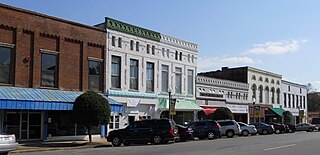
Talladega is the county seat of Talladega County, Alabama, United States. It was incorporated in 1835. At the 2020 census, the population was 15,861. Talladega is approximately 50 miles (80 km) east of one of the state’s largest cities, Birmingham.

Morehouse College is a private historically Black men's liberal arts college in Atlanta, Georgia. Anchored by its main campus of 61 acres (25 ha) near downtown Atlanta, the college has a variety of residential dorms and academic buildings east of Ashview Heights. Along with Spelman College, Clark Atlanta University, and the Morehouse School of Medicine, the college is a member of the Atlanta University Center consortium. Founded by William Jefferson White in 1867 in response to the liberation of enslaved African-Americans following the American Civil War, Morehouse adopted a seminary university model and stressed religious instruction in the Baptist tradition. Throughout the late 1800s and early 1900s, the college experienced rapid, albeit financially unstable, institutional growth by establishing a liberal arts curriculum. The three-decade tenure of Benjamin Mays during the mid-20th century led to strengthened finances, an enrollment boom, and increased academic competitiveness. The college has played a key role in the development of the civil rights movement and racial equality in the United States.

Barber–Scotia College is a private unaccredited historically black college in Concord, North Carolina. It began as a seminary in 1867 before becoming a college in 1916. It is affiliated with the Presbyterian Church (USA).
Shaw University is a private Baptist historically black university in Raleigh, North Carolina. It is affiliated with the American Baptist Churches USA. Founded on December 1, 1865, Shaw University is the oldest HBCU to begin offering courses in the Southern United States. The school had its origin in the formation of a theological class of freedmen in the Guion Hotel. The following year it moved to a large wooden building, at the corner of Blount and Cabarrus Streets in Raleigh, where it continued as the Raleigh Institute until 1870. In 1870, the school moved to its current location on the former property of Confederate General Barringer and changed its name to the Shaw Collegiate Institute, in honor of Elijah Shaw. In 1875, the school was officially chartered with the State of North Carolina as Shaw University.

Virginia Union University is a private historically black Baptist university in Richmond, Virginia. It is affiliated with the American Baptist Churches USA.
LeMoyne–Owen College is a private historically black college affiliated with the United Church of Christ and located in Memphis, Tennessee. It resulted from the 1968 merger of historically black colleges and other schools established by northern Protestant missions during and after the American Civil War.

Clark Atlanta University is a private, Methodist, historically black research university in Atlanta, Georgia. Clark Atlanta is the first Historically Black College or University (HBCU) in the Southern United States. Founded on September 19, 1865 as Atlanta University, it consolidated with Clark College to form Clark Atlanta University in 1988. It is classified among "R2: Doctoral Universities – High research activity".
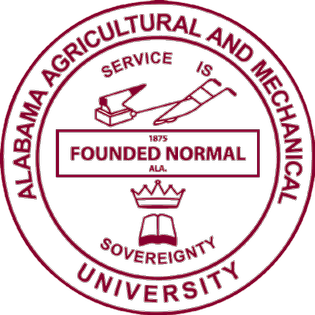
Alabama Agricultural and Mechanical University is a public historically black land-grant university in Normal, Huntsville, Alabama. Founded in 1875, it took its present name in 1969. AAMU is a member-school of the Thurgood Marshall College Fund and is accredited by the Southern Association of Colleges and Schools. Alabama Agricultural and Mechanical University Historic District, also known as Normal Hill College Historic District, has 28 buildings and four structures listed in the United States National Register of Historic Places.

Hampton University is a private, historically black, research university in Hampton, Virginia. Founded in 1868 as Hampton Agricultural and Industrial School, it was established by Black and White leaders of the American Missionary Association after the American Civil War to provide education to freedmen. The campus houses the Hampton University Museum, which is the oldest museum of the African diaspora in the United States and the oldest museum in the commonwealth of Virginia. First led by former Union General Samuel Chapman Armstrong, Hampton University's main campus is located on 314 acres in Hampton, Virginia, on the banks of the Hampton River.

Dexter Avenue Baptist Church is a Baptist church in Montgomery, Alabama, United States, affiliated with the Progressive National Baptist Convention. The church was designated as a National Historic Landmark in 1974 because of its importance in the civil rights movement and American history. In 1978 the official name was changed to the Dexter Avenue King Memorial Baptist Church, in memory of Dr. Martin Luther King Jr., who was pastor there and helped organize the Montgomery bus boycott in 1955 during the civil rights era. The church is located steps away from the Alabama State Capitol.
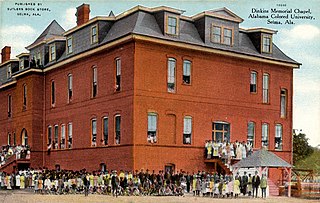
Selma University is a Private historically black Baptist Bible college in Selma, Alabama. It is affiliated with the Alabama State Missionary Baptist Convention.
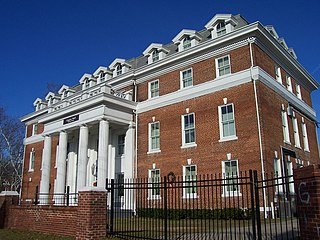
Allen University is a private historically black university in Columbia, South Carolina. It has more than 600 students and still serves a predominantly Black constituency. The campus is listed on the National Register of Historic Places as Allen University Historic District.

The Lincoln Normal School, originally Lincoln School and later reorganized as State Normal School and University for the Education of Colored Teachers and Students, was a historic African American school expanded to include a normal school in Marion, Alabama. Founded less than two years after the end of the Civil War, it is one of the oldest HBCUs in the United States.

Talladega College is a private historically black college in Talladega, Alabama. It is Alabama's oldest private historically black college and offers 17 degree programs. It is accredited by the Southern Association of Colleges and Schools.
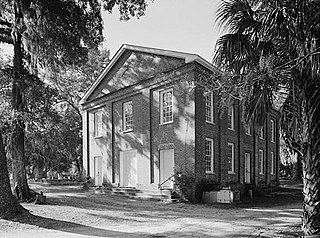
The Penn Center, formerly the Penn School, is an African-American cultural and educational center in the Corners Community, on Saint Helena Island. Founded in 1862 by Quaker and Unitarian missionaries from Pennsylvania, it was the first school founded in the Southern United States specifically for the education of African-Americans. It provided critical educational facilities to Gullah slaves freed after plantation owners fled the island, and continues to fulfill an educational mission. Leigh Richmond Miner photographed students and activities at the school.

Fountain Hall, formerly Fairchild Hall and Stone Hall, is a historic academic building on the grounds of Morris Brown College in Atlanta, Georgia. Built in 1882, it is the oldest surviving building originally associated with Atlanta University—now Clark Atlanta University—which is the first of all historically black colleges and universities in the American South founded September 19, 1865. It was declared a National Historic Landmark in 1974. It is now named after Bishop William A. Fountain.
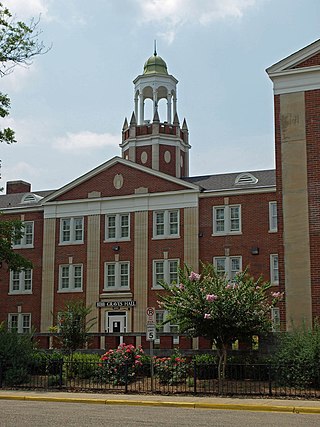
The Alabama State University Historic District is a 26-acre (11 ha) historic district at the heart of the Alabama State University campus in Montgomery, Alabama. It contains eighteen contributing buildings, many of them in the Colonial Revival style, and one site. The district was placed on the Alabama Register of Landmarks and Heritage on August 25, 1994, and the National Register of Historic Places on October 8, 1998.

















